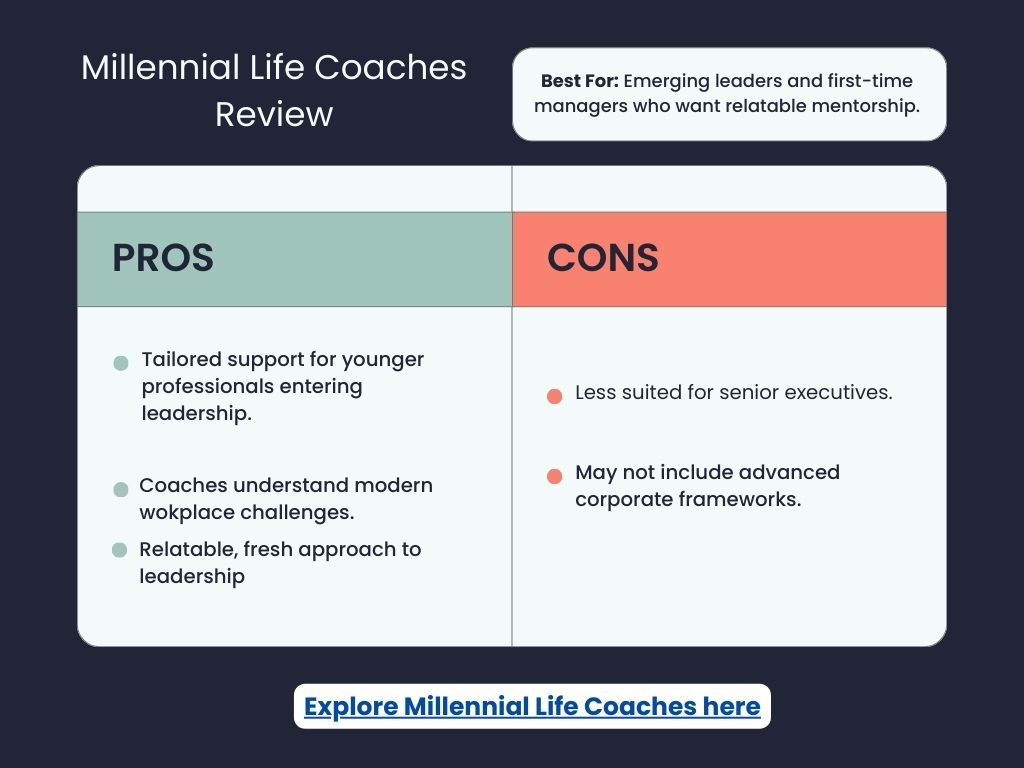Introduction
Let’s be real — leadership can feel lonely. Maybe you’re managing your first team and wondering if they’ll ever take you seriously. Or maybe you’ve been at it for a while but still feel like you’re just winging it. Either way, feeling stuck or unsupported doesn’t mean you’re failing — it means you’re ready for growth. And with the right coaching, you can find your footing and lead with confidence.
If you’re exploring leadership coaching services, you might also want to see our full guide to Top Leadership Coaching Services for a broader comparison.
In this article, we’ll break down why this issue matters, the common mistakes leaders make, a framework for moving forward, real-world success stories, and practical steps you can start today. You’ll also discover trusted resources — including Millennial Life Coaches — that provide the kind of support you need to move from stuck to thriving.
Why This Issue Matters
Leadership isn’t just about titles — it’s about influence, trust, and the ability to inspire others toward a shared vision. But when leaders feel unsupported or misunderstood, everything begins to crack.
- The personal toll: According to Gallup, 82% of managers lack leadership skills among their teams. That statistic isn’t just about skill gaps — it reflects how many leaders are overwhelmed and underprepared. Left unchecked, it leads to burnout, anxiety, and even attrition.
- The organizational cost: A 2022 Deloitte Human Capital Trends Report revealed that companies with strong leadership development practices are 2.4x more likely to outperform competitors financially. When leaders lack proper mentorship, the ripple effect includes lower employee engagement, higher turnover, and missed opportunities.
- The generational gap: Emerging leaders often feel older leadership models don’t fit today’s workplace. Remote work, diversity, and mental health conversations require a new leadership toolkit. Without relatable support, younger leaders may disengage or leave leadership roles altogether.
In short, leadership without support isn’t just a personal struggle — it’s an organizational liability. Solving it benefits both you and everyone you lead.
Common Mistakes Leaders Make
1. Believing You Should “Figure It Out Alone”
A lot of us think asking for help makes us look weak. But here’s the thing: trying to go solo usually just makes the road longer and bumpier. Without feedback or mentorship, blind spots pile up — and they can seriously hold back your growth.
2. Following Outdated Leadership Advice
Not every “leadership rule” you hear applies today. Old-school command-and-control styles can come off as rigid and out of touch. Modern teams want empathy, inclusivity, and collaboration — and ignoring that gap will cost you trust fast.
3. Mistaking Busyness for Progress
We’ve all been there: filling the calendar, working late, checking off boxes — and still feeling stuck. Busyness isn’t growth. Without intentional development, it just leads to burnout. Real progress comes from reflection, skill-building, and coaching.
4. Ignoring Emotional Intelligence
Studies show emotional intelligence explains close to 90% of the gap between top performers and average ones. Yet it’s often brushed off as a “soft skill.” In reality, it’s the foundation of trust, influence, and connection — exactly what your team needs most from you.
5. Waiting for the Company to “Handle It”
It’s easy to assume your organization will eventually invest in leadership development. But the truth? Not every company makes it a priority. If you wait passively, you’ll just fall further behind. The leaders who thrive are the ones who take ownership of their own growth.
Not every leader feels stuck—some feel unsupported by their teams. In that case, Forward Steps Coaching offers a unique path
A Framework for Getting Unstuck: The 4R Model
To break free from feeling unsupported, leaders can use the 4R Leadership Growth Model:
- Recognize – Identify where you’re stuck. Is it confidence, communication, delegation, or vision? Naming the issue reduces its power.
- Reflect – Take time to evaluate your leadership approach. Journaling, feedback surveys, and honest conversations help uncover blind spots.
- Reframe – Shift from “I’m failing” to “I’m learning.” Mistakes aren’t signs of incompetence but growth opportunities when viewed correctly.
- Reach Out – Seek leadership mentorship and coaching that resonates with your context. Choose guides who understand today’s challenges, not just yesterday’s.
This framework empowers leaders to move from confusion to clarity and from isolation to connection.
Ineffective vs. Effective Leadership Approaches
| Ineffective Leadership | Effective Leadership |
|---|---|
| Pretends to “have it all figured out.” | Seeks feedback and mentorship openly. |
| Relies on outdated top-down management. | Embraces servant leadership and collaboration. |
| Focuses only on tasks and deadlines. | Invests in people and relationships. |
| Waits for company training. | Proactively invests in personal growth. |
| Avoids vulnerability. | Leads with authenticity and transparency. |
Why it matters: The shift from ineffective to effective leadership isn’t just about optics. Teams led by authentic, growth-oriented leaders report 23% higher engagement (Gallup) and outperform peers on innovation and retention.
Real-World Examples
1. Whitney Wolfe Herd – Bumble
When Wolfe Herd founded Bumble, she prioritized empathy, inclusivity, and modern workplace values. She redefined leadership not as command-and-control but as creating a culture where employees — and users — felt safe and empowered.
Lesson: A leader’s vision can reshape entire industries when it’s rooted in listening and responding to people’s real needs.
2. Starbucks – Servant Leadership in Action
Howard Schultz emphasized servant leadership, focusing on baristas’ well-being as much as customer satisfaction. By providing benefits, career development, and inclusive leadership, Starbucks built loyalty among employees and customers alike.
Lesson: Supporting your people creates a foundation for long-term success.
3. Millennial Managers in Startups
Many startups have adopted coaching-first leadership. Instead of command-and-control, young leaders act as facilitators. This shift attracts top talent who value belonging and development.
Lesson: Modern leadership is less about giving orders, more about building trust.
Actionable Steps You Can Take Today
- Audit Your Leadership Style
Grab a notebook and jot down your top three strengths and the three areas where you struggle most. Then ask a couple of colleagues for anonymous feedback. Seeing yourself from their perspective can be eye-opening. - Block Time for Reflection
Leadership growth doesn’t happen in the middle of chaos. Set aside 20 minutes once a week to reflect. Journal about what went well, what challenged you, and how you responded. Even short reflections can spark big insights. - Invest in Emotional Intelligence
Next meeting you’re in, practice active listening — really listen instead of thinking about your response. Write down one new thing you learn about your team. Small habits like this build emotional intelligence over time. - Find a Relatable Mentor
You don’t need to figure this out alone. Join a program like Millennial Life Coaches, where mentors understand modern challenges and can help you grow. Look for leadership coaching services that match your stage of growth and commit to regular check-ins. - Practice Small Vulnerabilities
Try sharing one mistake you made recently and what you learned from it. Invite your team to do the same. This kind of honesty builds trust faster than any leadership book ever could. - Set Development Goals
Pick one leadership skill to work on this quarter — maybe conflict resolution or coaching your team more effectively. Write it down, track your progress, and celebrate small wins along the way.
Recommended Resource
If you’re feeling unsupported or stuck, the best solution isn’t more isolation — it’s connection. That’s where Millennial Life Coaches comes in.
- What it is: A platform that connects emerging leaders with relatable mentors who understand today’s challenges.
- Why it helps: Unlike generic training, these coaches bring fresh, practical insights that resonate with modern professionals.
- How it solves the problem: You’ll gain not just strategies, but emotional support, accountability, and a sense of belonging that helps you grow into the leader you want to be.
👉 Click here to explore Millennial Life Coaches and discover leadership coaching services that speak your language and fit your journey.
Conclusion
Here’s the truth — feeling unsupported as a leader doesn’t mean you’re not cut out for the role. It’s simply a sign that you’re ready for the next stage of growth. By spotting the common traps, applying frameworks like the 4R Model, and leaning on relatable mentorship, you can turn those stuck moments into stepping stones.
Your growth matters — not just for your career, but for the people who count on you every day. Don’t wait for someone else to hand you the tools. Take that first step, ask for support, and start building the kind of leadership that inspires trust.
If you’re ready to move from stuck to thriving, check out resources like Millennial Life Coaches and join communities where your leadership journey is supported every step of the way.
Want to compare Millennial Life Coaches with other options? Check out our full breakdown of Leadership Coaching Services, including Simply.Coach, Brian Tracy, Uplifting Leadership, and Forward Steps.
FAQs
1. What if I don’t have access to mentors at work?
Seek external mentorship programs like Millennial Life Coaches or professional communities online. You don’t have to rely solely on your company.
2. Is leadership coaching worth the investment?
Yes. Leaders with coaching support report 70% improvement in work performance and relationships (ICF study).
3. How do I know if I’m stuck in my leadership?
You’re stuck if you feel overwhelmed, unsupported, or unclear about your next steps. That’s your cue to seek support and structure.
4. Can mentorship help with imposter syndrome?
Absolutely. Relatable mentors normalize struggles and provide actionable strategies to build confidence.
5. What’s the difference between leadership training and coaching?
Training teaches general skills, while coaching personalizes growth to your unique challenges and goals. Most leaders benefit from both.
6. What is Millennial Life Coaches?
Millennial Life Coaches is a platform dedicated to helping emerging leaders through relatable mentorship. Unlike traditional coaching, it focuses on the modern challenges younger professionals face — from building confidence to managing diverse teams. Personalized coaching and accountability provide the support leaders need to thrive in today’s workplace.
Additional Resources
For leaders serious about growth, here are respected resources to deepen your learning:
- The Servant as Leader – Robert K. Greenleaf
- Leaders Eat Last – Simon Sinek
- Dare to Lead – Brené Brown
- The Speed of Trust – Stephen M.R. Covey
- Emotional Intelligence 2.0 – Travis Bradberry & Jean Greaves
- Harvard Business Review leadership articles
- Gallup State of the Global Workplace Report
- Deloitte Human Capital Trends Report


